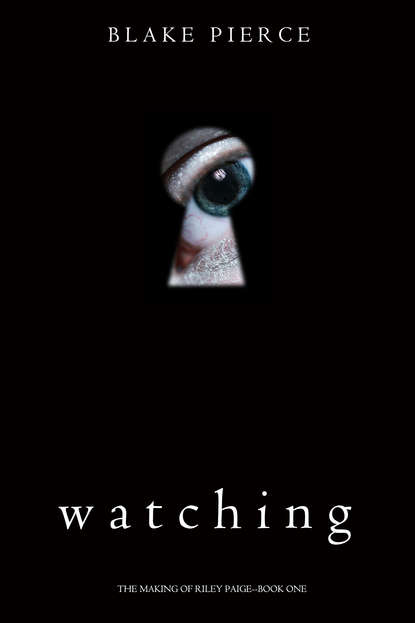
Полная версия:
Блейк Пирс Watching
- + Увеличить шрифт
- - Уменьшить шрифт

Blake Pierce
Watching
Blake Pierce is author of the bestselling RILEY PAGE mystery series, which includes twelve books (and counting). Blake Pierce is also the author of the MACKENZIE WHITE mystery series, comprising eight books; of the AVERY BLACK mystery series, comprising six books; of the KERI LOCKE mystery series, comprising five books; and of the new MAKING OF RILEY PAIGE mystery series, which begins with WATCHING.
An avid reader and lifelong fan of the mystery and thriller genres, Blake loves to hear from you, so please feel free to visit www.blakepierceauthor.com to learn more and stay in touch.
Copyright © 2018 by Blake Pierce. All rights reserved. Except as permitted under the U.S. Copyright Act of 1976, no part of this publication may be reproduced, distributed or transmitted in any form or by any means, or stored in a database or retrieval system, without the prior permission of the author. This ebook is licensed for your personal enjoyment only. This ebook may not be re-sold or given away to other people. If you would like to share this book with another person, please purchase an additional copy for each recipient. If you’re reading this book and did not purchase it, or it was not purchased for your use only, then please return it and purchase your own copy. Thank you for respecting the hard work of this author. This is a work of fiction. Names, characters, businesses, organizations, places, events, and incidents either are the product of the author’s imagination or are used fictionally. Any resemblance to actual persons, living or dead, is entirely coincidental. Jacket image Copyright Korionov, used under license from Shutterstock.com.
WATCHING (Book #1)
WAITING (Book #2)
RILEY PAIGE MYSTERY SERIESONCE GONE (Book #1)
ONCE TAKEN (Book #2)
ONCE CRAVED (Book #3)
ONCE LURED (Book #4)
ONCE HUNTED (Book #5)
ONCE PINED (Book #6)
ONCE FORSAKEN (Book #7)
ONCE COLD (Book #8)
ONCE STALKED (Book #9)
ONCE LOST (Book #10)
ONCE BURIED (Book #11)
ONCE BOUND (Book #12)
ONCE TRAPPED (Book #13)
MACKENZIE WHITE MYSTERY SERIESBEFORE HE KILLS (Book #1)
BEFORE HE SEES (Book #2)
BEFORE HE COVETS (Book #3)
BEFORE HE TAKES (Book #4)
BEFORE HE NEEDS (Book #5)
BEFORE HE FEELS (Book #6)
BEFORE HE SINS (Book #7)
BEFORE HE HUNTS (Book #8)
BEFORE HE PREYS (Book #9)
AVERY BLACK MYSTERY SERIESCAUSE TO KILL (Book #1)
CAUSE TO RUN (Book #2)
CAUSE TO HIDE (Book #3)
CAUSE TO FEAR (Book #4)
CAUSE TO SAVE (Book #5)
CAUSE TO DREAD (Book #6)
KERI LOCKE MYSTERY SERIESA TRACE OF DEATH (Book #1)
A TRACE OF MUDER (Book #2)
A TRACE OF VICE (Book #3)
A TRACE OF CRIME (Book #4)
A TRACE OF HOPE (Book #5)
CHAPTER ONE
Riley sat hunched on her bed staring at her psychology book. She couldn’t concentrate, not with all the noise in the room. That song was blaring again—Gloria Estefan’s “Don’t Let This Moment End.”
How many times had she heard that stupid song just this evening? It seemed to be blasting out of every dorm room these days.
Riley yelled over the music at her roommate …
“Trudy, please let this moment end! Or this song, anyway. Or just shoot me maybe.”
Trudy laughed. She and their friend Rhea were sitting on Trudy’s bed on the other side of the room. They’d just finished doing each other’s nails and were now waving their hands around in the air to dry them.
Trudy yelled back over the music, “Sure, I will, not.”
“We’re torturing you,” Rhea added. “No peace until you go out with us.”
Riley said, “It’s Thursday night.”
“So?” Trudy said.
“So, I’ve got an early morning class tomorrow.”
Rhea said, “Since when do you need sleep?”
“Rhea’s right,” Trudy added. “I’ve never known such a night owl in my life.”
Trudy was Riley’s best friend, a blonde with a huge, goofy grin that charmed pretty much everybody she met, especially guys. Rhea was a brunette—prettier than Trudy and somewhat more reserved by nature, although she tried her best to keep pace with Trudy’s gregariousness.
Riley let out a groan of despair. She got up from her bed and walked over to Trudy’s CD player, turned the music down, then climbed back onto her bed and picked up the psych book again.
And of course, right on cue, Trudy got up and turned the music back up again—not as loud as before, but still too loud for Riley to be able to concentrate on reading.
Riley slammed her book shut.
“You’re going to make me resort to violence,” she said.
Rhea laughed and said, “Well, at least it would be a change. If you keep sitting there all scrunched up like that, you’ll get stuck in that position.”
Trudy added, “And don’t go telling us you’ve got to study. I’m in that psych class too, remember? I know you’re reading way ahead in that stupid book—weeks ahead maybe.”
Rhea let out a gasp of mock horror. “Reading ahead? Isn’t that, like, illegal? Because it sure ought to be.”
Trudy nudged Rhea and said, “Riley likes to impress Professor Hayman. She’s got a thing for him.”
Riley snapped, “I do not have a thing for him!”
Trudy said, “Sorry, my mistake. Why would you have a thing for him?”
Riley couldn’t help thinking …
Just because he’s young and cute and smart?
Just because every other girl in the class has a crush on him?
… but she kept her thoughts to herself.
Rhea held her hand out and studied her nails.
She said to Riley, “How long has it been since you got any action? Sex-wise, I mean.”
Trudy shook her head at Rhea.
“Don’t ask,” she said. “Riley has taken a vow of chastity.”
Riley rolled her eyes and told herself …
Don’t even dignify that with a snotty reply.
Then Trudy said to Rhea, “Riley’s not even on the pill.”
Riley’s widened with shock at Trudy’s indiscretion.
“Trudy!” she said.
Trudy shrugged and said, “It’s not like you swore me to secrecy about it or something.”
Rhea mouth had dropped open. Her horror seemed genuine this time.
“Riley. Say it ain’t so. Please, please tell me she’s lying.”
Riley growled under her breath and said nothing.
If only they knew, she thought.
She didn’t like to think about her rebellious teen years, much less talk about them. She’d been lucky not to get pregnant or catch some horrible disease. In college, she’d cooled off a lot of things—including sex, although she always carried a box of condoms in her purse just in case.
Trudy pointedly turned the music back up.
Riley heaved a sigh and said, “OK, I give up. Where do you want to go?”
“The Centaur’s Den,” Rhea said. “We need some serious drinkage.”
“Where else is there?” Trudy added.
Riley swung her legs off her bed and got on her feet.
“Am I dressed OK?” she asked.
“Are you kidding?” Trudy said.
Rhea said, “The Den’s grungy, but not that grungy.”
Trudy walked over to the closet and rummaged through Riley’s clothes.
She said, “Do I have to be like your mom or something? Here’s what you need to wear.”
Trudy took out a spaghetti-strapped crop top and a nice pair of jeans and handed them to Riley. Then she and Rhea went out into the hall to round up some of the girls on their floor to join them.
Riley changed clothes, then stood looking at herself in the long mirror on the closet door. She had to admit, Trudy had picked out a good look for her. The crop top flattered her slender, athletic body. With her long dark hair and hazel eyes she could pass for a college party girl.
Even so, it felt oddly like a costume, not like Riley at all.
But her friends were right, she did spend a lot of time studying.
And surely there was such a thing as overdoing it.
All work and no play …
She pulled on a denim jacket and whispered to herself in the mirror …
“Come on, Riley. Get out there and live a little.”
*When she and her friends opened the door to the Centaur’s Den, Riley was almost overcome by the familiar but suffocating smell of cigarette smoke and the equally suffocating noise of heavy metal music.
She hesitated. Maybe this outing was a mistake after all. Were the grinding chords of Metallica a musical improvement over even the numbing monotony of Gloria Estefan?
But Rhea and Trudy were behind her, and they pushed her on inside. Three other girls from the dorm followed them in, then headed straight for the bar.
Peering through the smoky air, Riley saw some familiar faces. She was surprised to find so many here on a weeknight.
Most of the space was a dance floor where moving beams and sparkles flashed across kids who were happily writhing to a chorus of “Whiskey in the Jar.”
Trudy grabbed both Riley and Rhea by the hands.
“Come on, let’s dance, the three of us!”
It was a familiar tactic—girls would dance together until they caught the eyes of some guys. It wouldn’t be long before they’d all be dancing with guys instead of each other—and drinking like crazy.
But Riley was in no mood for that—or for the noise, for that matter.
Smiling, she shook her head and pulled her hand away from Trudy.
Trudy looked hurt for a moment, but it was too loud in here to have an argument about it. Then Trudy stuck her tongue out at Riley and pulled Rhea out onto the dance floor.
Yeah, real mature, Riley thought.
She pushed through the crowd to the bar and bought herself a glass of red wine. Then she headed downstairs, where tables and booths filled a basement room. She found an empty booth where she could sit down.
Riley liked it a lot better down here than upstairs. True, the cigarette smoke was even thicker, enough to sting her eyes. But it was less frenzied, and quieter too, although muffled music from upstairs still thudded down through the floorboards.
She sipped her wine slowly, remembering her reckless teenage drinking all too well. She’d always managed to get whatever she wanted to drink from seedy adult connections in the little town of Larned. Whiskey had been her booze of choice in those days.
Poor Uncle Deke and Aunt Ruth, she thought. Out of her anger and boredom, she’d put them through more than their share of trouble.
She kept telling herself …
Maybe I’ll make it up to them someday.
Her thoughts were interrupted by a male voice.
“Hey.”
Riley looked up and saw a big, muscular, reasonably good-looking guy holding a mug of beer and gazing down at her with a rakish, confident smile.
Riley squinted—an expression that silently asked …
“Do I know you?”
Of course, Riley knew exactly who it was.
It was Harry Rampling, the quarterback for the university football team.
Riley had seen him take this same approach with lots of girls—presenting himself without introduction, because he took it for granted that he was already known far and wide as God’s gift to all the women on campus.
Riley knew that this tactic usually worked. Lanton had a lousy football team, and Harry Rampling wasn’t likely to wind up with a career in professional football, but he was a hero here in Lanton all the same, and girls were usually all over him.
She simply stared at him with a quizzical expression, as if she had no idea who he might by.
His smile faded a little. It was hard to tell in the dim light, but Riley suspected that he was blushing.
Then he walked away, apparently embarrassed but unwilling to stoop to the indignity of actually introducing himself.
Riley took a sip of her wine, enjoying her small victory and a bit of solitude.
But then she heard another male voice.
“How did you do that?”
Another guy was standing beside her booth holding a beer. He was well dressed, well built, somewhat older than she was, and he immediately struck Riley as markedly more attractive than Harry Rampling.
“How did I do what?” Riley asked.
The guy shrugged.
“Repulse Harry Rampling like that. You got rid of him without saying a word, not even so much as a ‘fuck off, buster.’ I didn’t know that was even possible.”
Riley felt strangely disarmed by this guy.
She said, “I sprayed myself with jock repellant before I came here.”
As soon as the words were out, she thought …
Good God, I’m being witty with him.
What the hell did she think she was doing?
He smiled, enjoying the little joke.
He slipped uninvited into the seat across from Riley and said, “My name is Ryan Paige, and you don’t know me from Adam, and I won’t blame you if you forget my name in five minutes or even sooner. I can assure you that I’m eminently forgettable.”
Riley was startled by his audacity.
Don’t introduce yourself, she told herself.
But she said aloud …
“I’m Riley Sweeney. I’m a senior. Psychology major.”
She felt herself blushing now.
This guy was smooth, all right. And his pickup technique was so casual that it didn’t seem like a technique at all.
Forgettable, hah, Riley thought.
She was already sure she wasn’t going to forget Ryan Paige anytime soon.
Be careful with him, she told herself.
Then she said, “Um—are you a student here at Lanton?”
He nodded and said, “Law school. I’m finishing up this year too.”
He said it as though there was no reason for her to be impressed.
And of course, Riley was impressed.
They sat talking for a while—she didn’t know how long exactly.
When he asked her what she planned to do after graduation, Riley had to admit that she wasn’t sure.
“I’ll look for a job of some kind,” she told him. “I guess I’ll have to figure out a way to go to graduate school if I’m going to work in my field.”
He nodded approvingly and said, “I’ve been making inquiries with several law firms. A couple of them look promising, but I need to consider my next step really carefully.”
As they talked, Riley realized that whenever their eyes met and their gazes held steady for a moment, a slight tingle ran through her body.
Was that happening to him, too? She noticed that he did look away suddenly a few times.
Then, during a lull in the conversation, Ryan finished his beer and said, “Look, I’m sorry to rush off, but I’ve got a class in the morning and some studying to do.”
Riley was almost dumbstruck.
Wasn’t he going to make a pass at her?
No, she thought. He’s got too much class for that.
Not that he didn’t have his sights on her—she was sure he did.
But he knew better than to move on her too fast.
Impressive, she thought.
She managed to reply, “Yeah, me too.”
He smiled a sincere-looking smile.
“It was nice to meet you, Riley Sweeney.”
Riley smiled back.
“It was nice to meet you too, Ryan Paige.”
Ryan chuckled and said, “Aw, you remembered.”
Without another word, he got up and left.
Riley’s mind boggled at all that hadn’t happened. They hadn’t exchanged phone numbers, she hadn’t mentioned which dorm she was in, and she still had no idea where he lived. And he hadn’t even asked her out on a real future date.
It wasn’t because he didn’t expect there to be a real date, she was sure of that.
No, he was simply confident. He was sure their paths would cross again soon, and he expected chemistry to kick in.
And Riley more than half-believed he was right.
Just then she heard Trudy’s voice call out.
“Hey, Riley! Who was the cute guy?”
Riley turned and saw Trudy coming down the stairs, carrying a full pitcher of beer in one hand and a mug in the other. Three other girls from their dorm were tagging along behind her. They all looked pretty drunk.
Riley didn’t reply to Trudy’s question. She only hoped Ryan was out of earshot by now.
As the girls approached the table, Riley asked …
“Where’s Rhea?”
Trudy looked all around.
“I dunno,” she said in a slurred voice. “Where is Rhea?”
One of the other girls said, “Rhea went back to the dorm.”
“What!” Trudy said. “She left and didn’t tell me?”
“She did tell you,” another girl said.
The girls were all about to climb into the booth with Riley. Rather than get trapped in there with them, Riley got up from her seat.
“We should all go home,” she said.
With a flurry of protests, the girls seated themselves, giggling and obviously settling in for a long night.
Riley gave up on them. She walked upstairs and out the front door. Outside, she took a deep breath of cool, fresh air. It was March and sometimes cold at night here in the Shenandoah Valley of Virginia, but the chill was welcome after the stuffy, smoke-filled bar.
It was a short, well-lit walk back to the campus and her dorm. She felt that the evening had turned out pretty well. She’d only had a glass of wine, just enough to be relaxing, and there had also been that guy …
Ryan Paige.
She smiled.
No, she hadn’t forgotten his name.
*Riley was sleeping deeply and dreamlessly when something jarred her awake.
What? she wondered.
At first, she thought maybe someone had shaken her by the shoulder.
But no, that wasn’t it.
As she stared into the darkness of her dorm room, she heard the sound again.
A shriek.
A voice filled with terror.
Riley knew that something terrible had happened.
CHAPTER TWO
Riley was out of her bed and on her feet before she was fully awake.
That sound had been horrible.
What was it?
When she switched on the light beside her bed, a familiar voice grumbled from across the room, “Riley—what’s going on?”
Trudy was lying in her own bed fully clothed, shielding her eyes against the light. She obviously had collapsed there in a fairly inebriated state.
Riley had slept right through her roommate’s arrival.
But she was awake now.
So were others in the dorm. She could hear alarmed voices calling out from the rooms nearby.
Riley went into motion, shoving her feet into slippers, pulling on her robe, and opening their room door. She stepped out into the hallway.
Other room doors were swinging open. Girls were poking their heads out, asking what was wrong.
And Riley could see at least one thing that was wrong. About halfway down the hall, a girl was collapsed on her knees, sobbing.
Riley raced toward her.
Heather Glover, she realized.
Heather had been with them at the Centaur’s Den. She’d still been there with Trudy and the others when Riley left.
Now Riley knew—it was Heather she’d heard screaming.
She also remembered …
Heather is Rhea’s roommate!
Riley reached the sobbing girl and crouched beside her.
“What’s wrong?” she asked. “Heather—what happened?”
Sobbing and choking, Heather pointed to the open door next to her.
She managed to gasp …
“It’s Rhea. She’s—”
Heather suddenly threw up.
Dodging the spray of vomit, Riley stood up and peered into the room door. In the light shining in from the hallway, she could make out something spread out on the floor—a dark liquid. At first she thought it was spilled soft drink.
Then she shuddered …
Blood.
She’d seen blood pooled like this before. There was no mistaking it for anything else.
She stepped into the doorway and quickly saw that Rhea lay sprawled across her single bed, fully clothed and with her eyes wide open.
“Rhea?” Riley said.
She peered closer. Then she gagged.
Rhea’s throat was slashed almost from ear to ear.
Rhea was dead—Riley knew that for certain.
It wasn’t the first murdered woman she’d seen in her life.
Then Riley heard another scream. For a moment she wondered if the scream might be her own.
But no—it was coming from right behind her.
Riley turned, and there in the doorway stood Gina Formaro. She’d also been partying at the Centaur’s Den that night. Now her eyes were bulging and she was trembling all over, pale with shock.
Riley realized that she herself felt remarkably calm, not scared at all. She also knew that she was probably the only student on the whole floor who wasn’t already in a state of panic.
It was up to her to make sure things didn’t get even worse.
Riley gently took Gina by the arm and led her out of the doorway. Heather was still there on the floor where she had vomited, still sobbing. And other wandering students were beginning to make their way toward the room.
Riley pulled the room door closed and stood in front of it.
“Stay back!” she yelled at the approaching girls. “Stay away!”
Riley was surprised at the force and authority in her own voice.
The girls obeyed, forming a crowded semicircle around the dorm room.
Riley yelled again, “Somebody call nine-one-one!”
“Why?” one of the girls asked.
Still crouched on the floor with a pool of vomit in front of her, Heather Glover managed to croak out …
“It’s Rhea. She’s been murdered.”
Suddenly a wild mix of girls’ voices exploded in the hallway—some screaming, some gasping, some sobbing. A few of the girls pushed toward the room again.
“Stay back!” Riley said again, still blocking the doorway. “Call nine-one-one!”
One of the girls who owned a little cell phone was carrying it in her hand. She made the call.
Riley stood there wondering …
What do I do now?
She only knew one thing for certain—she couldn’t let any of the girls into the room with the body. There was enough panic on the floor already. It would only get worse if more people saw what was in that room.
She also felt sure that no one was supposed to walk around in …
In what?
A crime scene, she realized. That room was a crime scene.
She remembered—she was sure it must be from movies or TV shows—that the police would want the crime scene to be as untouched as possible.
All she could do was wait—and keep everybody out.
And so far she was being successful. The semicircle of students began to break up, and girls wandered off into smaller groups, disappearing into rooms or forming little clusters in the hallway to share their horror. There was a lot of crying now, and some low, animal-like wailing. A few more cell phones were appearing, those who owned them calling parents or friends to report their versions of the disaster.
Riley thought that probably wasn’t a good idea, but she had no way to stop them. At least they were staying away from the door that she guarded.
And now she was starting to feel her own share of horror.
Images from her early childhood flooded Riley’s brain …
Riley and Mommy were in a candy store—and how Mommy was spoiling Riley!
She was buying her lots and lots of candy.
They were both laughing and happy until …
A man stepped toward them. He had a weird face, flat and featureless, like something out of one of Riley’s nightmares. It took Riley a second to realize that he was wearing a nylon stocking over his head—the kind that Mommy wore on her legs.
And he was holding a gun.
He started yelling at Mommy …
“Your purse! Give me your purse!”
His voice sounded as frightened as Riley felt.
Riley looked up at Mommy, expecting her to do as the man said.
But Mommy had turned pale and was shaking all over. She didn’t seem to understand what was going on.
“Give me your purse!” the man yelled again.
Mommy just stood there, clutching her purse.
Riley wanted to tell Mommy …
“Do as the man says, Mommy. Give him your purse.”
But for some reason, no words came out of her mouth.
Mommy staggered a little, as if she wanted to run but couldn’t make her legs move.
Then there was a flash and a loud, terrible noise …
… and Mommy fell to the floor, landing on her side.





